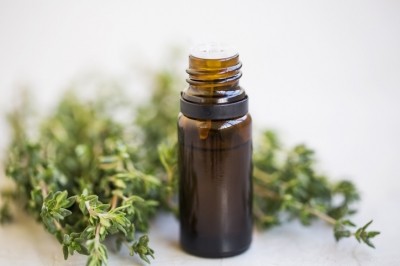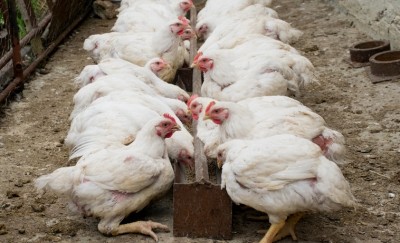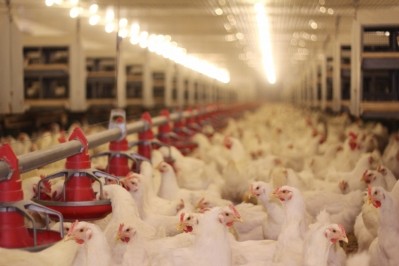IRTA finds probiotics, prebiotics and plant extracts can improve immune status of chickens
![Supplementation of poultry diets with Bacillus spp. improves performance: IRTA review [pic:(c) istock.com/spinka]](/var/wrbm_gb_food_pharma/storage/images/_aliases/wrbm_large/3/2/7/3/2383723-1-eng-GB/IRTA-finds-probiotics-prebiotics-and-plant-extracts-can-improve-immune-status-of-chickens.jpg)
The IRTA authored feed additive evaluation report, produced on behalf of the European Food Safety Authority (EFSA), also found performance gains in birds from supplementation of feed with other probiotic strains or prebiotics or certain plant extracts.
Joaquim Brufau, coordinator of the nutrition, health and animal welfare program of the Barcelona based research institute, IRTA, headed up the immune stimulators assessment, which had been commissioned by EFSA in 2014 to support efficacy assessment work by its FEEDAP Panel in relation to those types of feed substances.
The IRTA team assessed in what way, if any, certain additives have a beneficial effect on the immune system of a range of livestock and fish. “In most cases, the mode of action of these additives is unknown, which makes assessment of their efficacy difficult,” said the authors.
The experts said they screened 1144 scientific articles, which provided data for around 185 additives with the potential to play a role in supporting the immune system of farm animals and fish.
For each additive type, the IRTA experts identified the mode of action for various animal species, interactions with other dietary compounds, relevant end-points that could show efficacy, methods for the objective measurement of end-points, along with the risks for the safety of the animal, consumer, users and the environment.
Probiotics
The assessors said the most common additives looked at with regard to their effects on the immunity of poultry were probiotics and prebiotics, with 373 studies of probiotics in poultry considered.
The authors found adding Lactobacillus spp. to broiler diets improves the birds’ performance and decreases the numbers of coliforms in the cecum 10 and 20 days after feeding.
They noted Lactobacillus significantly increased the total volatile fatty acids (VFA) in the ileum and cecum and reduces the caecal pH values. Increments in the villus height (VH) and crypt depth (CD) of chickens fed that strain could improve the absorptive surface area in the GI tract, said the IRTA team.
“The Lactobacillus spp. birds showed increased goblet cell (GC) numbers, total GC area, GC mean size and mucosal thickness. Lactobacillus spp. has an immunoregulatory effect of dietary probiotics of the local immune system in broiler chickens,” wrote the reviewers.
The team did determine that Lactobacillus spp. was also efficient in stimulating the production of total intestinal and serum IgA and IgG.
They stressed the anti-inflammatory response of Lactobacillus would appear to be dependent on the characteristics and quantity of the strain involved.
Meanwhile the authors reported the supplementation of poultry diets with Bacillus spp. improves performance and increases the relative weight of immune organs.
Bacillus spp. also improved gut health and integrity by increasing the villus height as well as the villus height to crypt depth ratio, wrote the IRTA team.
“Dietary supplementation with Bacillus spp. can potentially alter gut microflora by selectively stimulating the growth of beneficial bacteria while suppressing the growth of pathogenic bacteria,” they wrote.
They also found that Dietary Bacillus spp. lowered IFN-g, IL- 1b, and CXCLi2 cytokine mRNA expression in chickens, and downregulated IL-2, IL-4 and IL-6, favoring an anti-inflammatory response in the gut.
“This indicates that Bacillus had both local and systemic immunity effects. Bacillus spp. was also efficient in stimulating the production of total intestinal and serum IgA and IgG,” wrote the IRTA assessors.
Their review, they said, indicated the supplementation of poultry diets with Enterococcus spp. improves growth performance and reduces the counts of pathogenic bacteria in the gut; it also reduces the spread of pathogens. E. faecium also plays a beneficial role in jejunal morphology and may reduce oxidative damage, found the team.
The Enterococcus strain can increase phagocytosis as well as strength non-specific immunity, said the authors.
They also found S. cerevisiae improves performance, immune function, and intestinal mucosal morphology of broilers.
Yeast supplement in the diet also increases the numbers of lactobacilli and decreases the numbers of total aerobic bacteria, coliforms, Enterobacteriaceae, and Enterococci, noted the IRTA experts.
Supplementation of S. cerevisiae fermentation product increased CD3+, CD4+, and CD8+ T-lymphocyte counts and the ratio CD4+:CD8+ in the blood and spleen as well as ileum intraepithelial lymphocyte count, caecal tonsil secretory IgA counts, serum lysozyme content, and albumin:globulin ratio.
Prebiotics
The IRTA analysis also evaluated 130 studies looking at the supplementation of poultry diets with prebiotics.
The assessors looked at 48 articles in relation to mannan oligosaccharides, 22 studies focused on yeast cell wall (YCW), 19 on glucan, 13 on fructooligosaccharides (FOS) along with 10 articles on inulin and other minor groups.
“Adding MOS to poultry diets has indicated improvements in performance, morphological development, villi height and goblet cell number, increased colonization by beneficial bacteria, and decreased pathogenic bacterial counts.”
The IRTA team found MOS supplementation in C. perfringens-challenged chickens supports a pro-inflammatory effect, via T-helper type-1 cell associated pathways, in order to control early stages of infection.
“In turkeys, MOS may help to reduce the pro-inflammatory response and susceptibility of the colonic epithelium to bacterial binding,” they added.
Supplementation of poultry diets with YCW improves performance and increases the height and width of the villi, which improve the absorption of nutrients, said the reviewers.
They said YCW may enhance the cell-mediated immune response in broiler chickens by modulating the production of cytokines. IL-1b and IL-6 expressions were significantly enhanced in the spleen of YCW-fed birds, suggesting that YCW might act as an immunoprotective agent by up-regulating the inflammatory response leading to enhanced protection against pathogens.
The IRTA experts also noted Glucan has been shown to increase the size of the primary and secondary lymphoid organs in broilers. “b-Glucan acts as an immunoprotective agent by upregulating the inflammatory response, leading to enhanced protection against intracellular pathogens,” wrote the authors.
Plant extracts
The IRTA evaluation also considered 109 studies about the use of plant extracts in poultry, including articles on Thymus vulgaris, Allium, Curcuma longa, Astragalus and Origanum derivatives, and studies on carvacrol.
“In chickens, thyme oil makes the intestinal barrier stronger against toxic feed derived substances or endogenously produced toxic metabolites, thus impeding their absorption into the organism. Thyme oil also influences the various antioxidant parameters, but the exact mechanism is unclear.
Garlic increases the relative weight of immune organs in chickens, which causes enhanced lymphocyte proliferation and white blood cell (WBC) counts. Additionally, garlic has potential antioxidative and antimicrobial properties,” found the report.
Meanwhile they found that supplementation of diets with carvacrol can improve intestinal morphology as well as cellular and humoral immune response. “Carvacrol can also reduce lipid oxidation in broiler meat,” added the team.
They also found chickens fed with Curcuma longa showed an increased humoral and cell mediated immune response.
“C. longa induces an anti-inflammatory response, which ameliorates the inflammation produced by infection caused by Eimeria,” said the reviewers.
In addition to plant extracts, pro and prebiotics, the reviewers said they looked at 106 studies of other substances in poultry from organic acids derivatives to fatty acids to vitamins to minerals to amino acids and derivatives, and enzymes but they said that due to the complexity of the data, a summary of the mode of action for those were not included in their report.
The full review can be read here.















